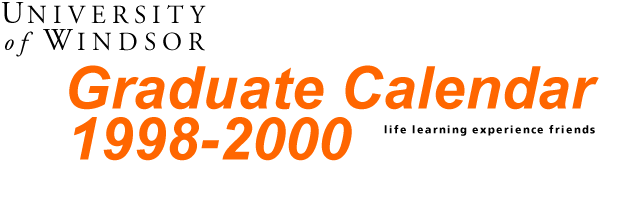| 18.3.1
COURSE DESCRIPTIONS
All of the following courses will not necessarily be offered in any
one year.
43-503. Modes of Historical Interpretation
This course will introduce students to current methodological and theoretical
issues in the study of history. Students will review the diverse modes
of contemporary historical analysis. Particular attention will be paid
to the relationship between history and the social sciences, the role of
narrative in historical writing, and the application of models in historical
explanation.
43-504. Historiography: Selected Topics
The subject of this course will vary from year to year, but its focus
will be on the development of historiographical interpretation in particular
fields.
43-507. Aspects of British History
The focus of this course may vary from year to year. The primary perspective
will be that of social history, and subjects may include social problems,
social protest, social reforms, and the women's movement in the nineteenth
and twentieth centuries.
43-521. Medieval Social History
This course will provide a thematic approach to the Middle Ages from
the perspective of social historians. Themes will vary from year to year
and may include marriage and the family, social institutions, women, the
history of sexuality, or popular religion.
43-522. Politics and Culture in the Era of the French Revolution
This course focuses on political life during the Revolutionary era,
perceived as comprising a variety of symbolic practices including language
and imagery.
43-524. Selected Topics in the History of Imperial Russia
This course explores the evolution of Russian society from the perspective
of social, cultural, and intellectual history. Although the themes, issues,
and groups examined are present throughout the imperial period, the focus
of this course will be primarily on developments in the nineteenth and
early twentieth centuries.
43-542. Canadian-American Relations
This course will examine the historic Canadian-American relationship
with particular reference to issues of the twentieth century.
43-543. Canada in the Nineteenth and Twentieth Centuries
The approach in this course is both thematic and historiographical.
Themes from social, political, economic, and intellectual history receive
attention, with some emphasis on the relations among them.
43-547. Local History: The Detroit-Windsor Region to the Present
A combination of Canadian urban and local history using Windsor and
the Border Cities as a case study. Economic growth and metropolitan development,
the urban landscape, population growth, and ethnic relationships; the urban
community—social, cultural, and political life.
43-561. Aspects of the History of the United States
This course will provide a thematic approach to the history of the
United States in the nineteenth and twentieth centuries. Themes will vary
from year to year and will touch on various social and political developments.
43-563. Studies in the History of Women and Gender
This course examines major themes in the history of women and gender
in North America, predominantly the United States. Themes include labour
and economic development; women and political life; the Afro-American experience;
the Native-American experience.
43-571. Introduction to Archival Administration
An introduction to the development of archives in the western world,
especially upon United States public and private institutions; terminology
and differences between library and archival techniques; the arrangement,
description and servicing of archival materials.
43-572. Archival Administration
A continuation of 43-571 designed to deal with more advanced and complicated
aspects of archival administration, such as literary legal rights, libel
and appraisal of records for historical and income tax purposes.
43-573. Conservation and Administration of Photography Collections
Basic course in the fundamentals of photographic conservation procedures
for the organization and control of photographic collections used for research
and historical documentation in archives.
43-574. Introduction to Archival and
Library Conservation
A basic course in the fundamentals of archival and library conservation
essential for effective management of programs of preventative and restorative
conservation for books, documents, maps, broadsides and works of art on
paper.
43-578. Records Management
Management of information, including records creation, records inventory
and appraisal, retention/disposition, scheduling, filing systems, maintenance
of inactive records, micrographics, vital records protection, and electronic
impact on records management.
43-579. Special Topics in Archival Science
43-580. Computer Applications for Archives and Records Management
Basic course on computer applications for the control, access, and
processing of archival materials and records in archives, libraries, historical
agencies, businesses, and museums.
43-581. Archival Description and Indexing
Description and indexing of archives using rules for description and
formation of access points. Specialization in development of archival finding
aids at institutional and collection levels.
43-582. Practicum
Archival students will be required to undertake a practicum of at least
one month's duration in a recognized archival institution. This will be
under the supervision of a senior archivist. The student will gain experience
in basic archival operations. (Prerequisite: successful completion of first-year
graduate courses.)
43-585. Oral History
A methodology for research techniques of gathering data from individuals
for use in research classroom teaching, in historical, cultural or other
contexts.
43-587. Administration of Historical Agencies
The operation of public and private historical agencies, archives,
and museums. Determination of agency priorities, problems of staffing and
finance, government regulations, community relations, and professional
ethics.
43-597. Selected Topics in History
43-598. Selected Topics in History
43-796. Major Paper
43-797. Thesis
Undergraduate senior courses, which may be assigned at the discretion
of the program coordinator to form part or all of the requirements of the
first year of the two-year graduate program, may be found in the Undergraduate
Calendar (see 3.9.3).
|


